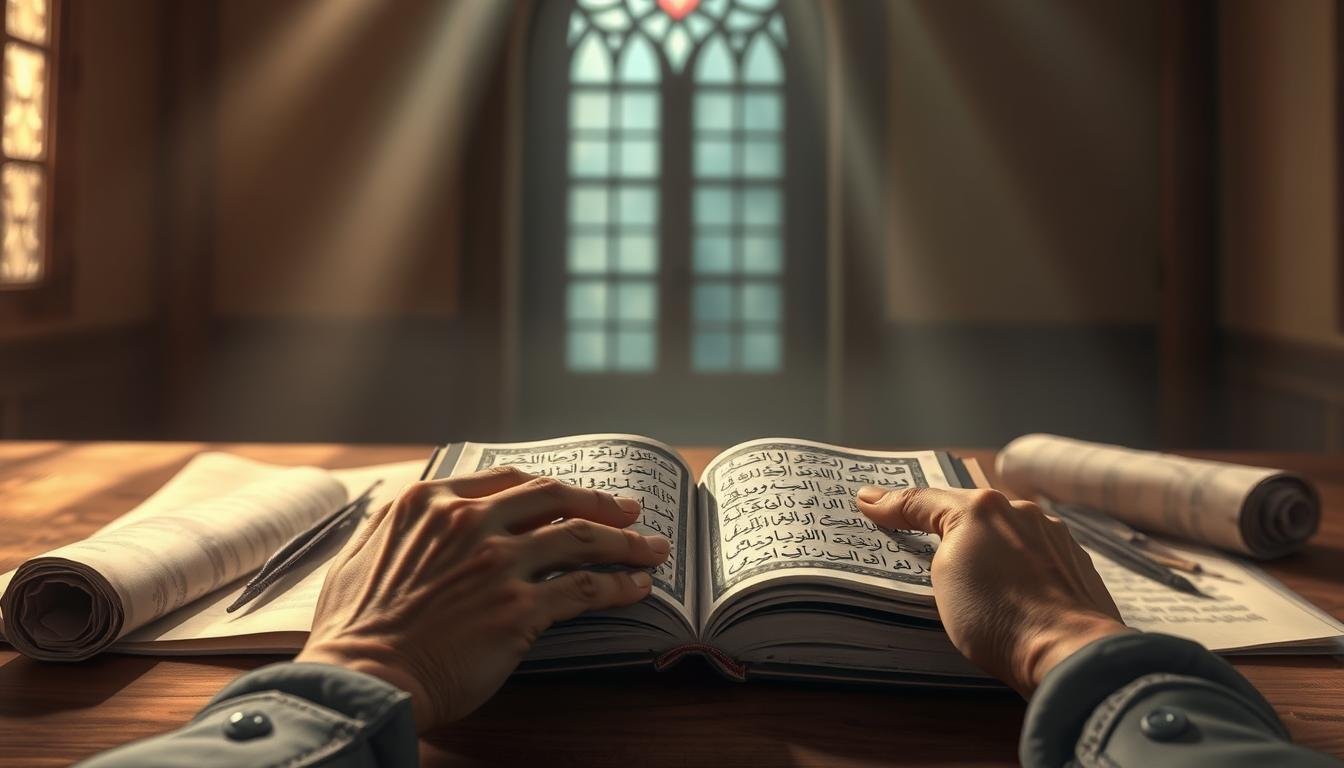Have you ever thought about how the Quran affects our lives? For over 1,400 years, Muslims have looked to the Prophet Muhammad for guidance. His words, like the Hadith about the Quran’s greatness, show its true value.
I often think about how these teachings connect us to the past and present. Every letter you read brings ten rewards. Even if reading Arabic is hard, the Prophet said you’ll get double blessings for trying.
Imagine angels gathering around a family reading Surah Al-Kahf, or a cloud shielding a reciter. These are not just stories. They remind us of the Quran’s power to change hearts.
As a teacher, I’ve seen the Quran’s wisdom help with today’s problems. From Mairajul Quran Academy’s free trials to the Prophet’s words on learning and teaching, this article invites you to explore. Whether you’re Muslim or just curious, these teachings offer clarity. Let’s see how a single verse can change your day and your future.
Understanding the Sacred Connection Between Hadith and Quran
The Quran and Hadith are deeply connected in Islam. The Quran is God’s word, and Hadith are the Prophet’s sayings. They help us understand the Quran’s teachings.
Hadith is important because the Quran tells us to follow God and His Messenger. The Prophet explained many Quranic teachings, like how to pray and give charity. For example, the Quran talks about Hajj briefly, but Hadith explains it in detail.
“The superiority of the Quran’s speech over all else is Allah’s superiority over His creation.”
Islamic scholars sort Hadith into two types: authentic and weak. Sahih collections, like Bukhari, have 25% verified narrations. This makes sure our faith is strong and based on reliable sources.
When we talk about hijab, Quran and Hadith work together. They guide us in making good, from how to pray to how to act in the community. This way, Quranic teachings are relevant for all time.
The Prophet Muhammad’s Most Powerful Hadith About Quran
In Islamic tradition, the Hadith about Quran is very important. It shows how the Quran is always relevant. The Prophet Muhammad said, “I have left among you two things; you will never go astray as long as you hold fast to them: the Book of Allah and my Sunnah,”
This teaching is key to Islamic learning. It connects the Quran to the Prophet’s life. This helps us grow morally and spiritually.
“The Book of Allah and my Sunnah”
This Hadith shows that guidance from the Quran and the Prophet’s actions are linked. For example, the Quran tells us to “enjoin good and forbid evil” (Quran 3:104). The Prophet showed us how to do this in real life.
He taught us that the Quran is not just words. It’s something we can follow. This reminds us to act on what the Quran says.
Consider the hadith: “The best among you are those who learn and teach the Quran” (Bukhari).498).3).12).1), Sahih al-Bukhari 5027).). This teaching is important. It tells us to study both the Quran and the Prophet’s actions.
By mixing Quranic verses with the Prophet’s teachings, Muslims keep their faith alive. This makes their faith strong and growing.
So, what does this mean for us today? It means we should study the Quran and live ethically. This balance is as important now as it was in the Prophet’s time. Whether we pray with the Quran or seek wisdom in Hadith, this balance guides us.
Historical Context: When and Why This Teaching Was Revealed
In 7th-century Arabia, the Prophet Muhammad’s final years were key. His companions gathered for the Farewell Sermon in 632 CE. His teachings became urgent, preparing his community for his death.

The Prophet’s Final Sermon and Its Significance
The sermon was given to over 100,000 followers. It talked about equality, justice, and the Quran’s power. The Prophet said, “I leave among you the Quran and my Sunnah…”.
This moment made Prophetic sayings important. It helped keep the community united.
Challenges Facing the Early Muslim Community
Regional conflicts and tribal identities were big challenges. The Prophet’s sayings tackled these issues head-on:
“You have a right to demand accountability from your leaders,”
he said. He wanted to change tribal loyalties to a shared Islamic identity.
Preservation of Divine Guidance for Future Generations
The Prophet knew the community might forget his teachings. So, he told them to memorize and write them down. After he died, Caliph Abu Bakr started writing down the Quran.
This way, Prophetic sayings and scripture were kept safe. This balance helped keep Islamic guidance strong for many years.
Scholarly Interpretations Across Islamic Traditions
Islamic tradition has always valued many voices in understanding the Prophet’s teachings. Sunni scholars like al-Ghazali and Shi’a experts like al-Shaykh al-Tusi look at Hadith collections in their own ways. Here’s a thought from Ibn Taymiyyah:
“Knowledge without action is blind, and action without knowledge is misguided.”
This wisdom guides how different groups focus on Hadith truth and use.
Sunni scholars use Bukhari and Muslim Hadiths to base their laws. Sufi teachers look at deeper meanings, like the Quran’s light verse as a sign of divine unity. Even among Sunnis, there are debates about Hadith truth. For example, a hadith on how to read the Quran is found in eight big collections but has small differences in words.
Over time, how scholars collect Hadiths has changed. Al-Bukhari and others worked hard to make sure messages were real. Now, experts like Amina Wadud mix old teachings with new ideas. They wonder how to apply ancient Hadiths on leadership to today’s democracies or how to balance old teachings with modern views on gender equality.
These talks show Islam’s lively thinking. Scholars, whether studying the Quran’s preservation or discussing the Imamate, agree on main points but also value their differences. This variety makes the community stronger, not weaker. It shows how Islamic tradition has grown and changed over the years.
How This Hadith Shapes Islamic Spirituality and Practice
Islamic spirituality focuses on reading and studying the Quran. This connects us to the divine. The Prophet’s teachings make these practices real and meaningful.
“The one who is proficient while reading the Quran is with the noble and upright recording angels” (Sahih Muslim).
Starting the day with Quranic verses is common. It helps millions connect with their faith. From morning to night, the Quran reflects our bond with God.
The hadith teaches us to engage actively with the Quran. It’s not just reading; it’s a dialogue with the divine.
Daily Recitation and Relationship with the Quran
Every verse recited purifies us. The Prophet taught us to share the Quran. This creates a sense of community.
Families and apps track progress. These practices show faith in action, everywhere.
Memorization Traditions and Their Significance
Memorizing the Quran sharpens our minds and morals. Scholars say it makes us wise. It’s like carrying a library of divine knowledge.
Even non-Muslims might wonder if it improves ethics. Science says yes, it helps us remember our faith.
Implementing Quranic Guidance in Contemporary Life
Young Muslims today face challenges like cyberbullying. They use Quranic verses to solve these problems. The hadith encourages learning the Quran in many ways.
It’s not just about reading; it’s about living by the Quran’s teachings. This includes facing modern issues like AI and climate change.
Lesser-Known Hadith About Quran That Complement the Main Teaching
Many know the basics, but there’s more to learn. Lesser-known Hadith about Quran offer deep wisdom. The Quran is like medicine for our souls and shows us our actions.
The Prophet (s.a.w) said, “Recite ten verses nightly to avoid being numbered among the negligent.” This teaches us the Quran’s importance in our daily lives. 
“And if you recite from the Qur’an during your supplication, you will find healing in it.” — Sunan Abi Dawood
Sayings on the Healing Properties of Quranic Verses
Early Muslims saw the Quran as more than words. They knew it could heal body and mind.
Companions used Quran verses to ease pain. One Hadith says reading the Quran can show you are a prophet. This shows how powerful the Quran is.
Experts argue over which verses cure what, but the main idea is clear. The Quran guides us.
Hadith on Teaching and Learning the Quran
How we teach matters. The Prophet (s.a.w) said, “The best among you are those who learn and teach the Quran.” But he also warned against using it for wealth.
There are three kinds of learners: those who show off, seek wealth, or seek Allah’s pleasure. This helps us think about why we learn the Quran.
Prophetic Guidance on Respecting the Physical Quran
Respecting the Quran’s physical form shows we value its message. A Hadith says not to put the Quran behind someone. This teaches us to be mindful when handling it.
Even today, scholars discuss how to store the Quran. But the main point is clear: treat the Quran with care. The Prophet’s emphasis on cleanliness teaches us to treat the Quran with respect.
Common Misunderstandings and Clarifications
I’ve seen many questions about Hadith teachings. Let’s clear up three main areas of confusion. First, the Hadith saying, “Do not argue in the Quran” (Jami as-Sagheer) means don’t reject its truths. It’s about seeking knowledge, not starting fights.
Some think just memorizing the Quran is enough. But the Prophet said, “Whoever speaks about the Quran without knowledge will take his seat in the Fire” (Tirmidhee). Learn more about Quranic context. True understanding comes from both memorizing and understanding verses like 2:255.
Another mistake is thinking Hadith and Quran are separate. They work together. Hadith helps us understand the Quran, like how the Prophet explained prayers. This shows how they’re connected, as Surah 5:101 says to “stand firmly for justice.”
By tackling these issues, we follow the Quran’s advice to “contemplate its verses” (38:29). Misunderstandings happen when we take teachings out of context. Let’s study scripture with respect and critical thinking to follow its timeless wisdom.
Why This Teaching Remains Relevant in Modern America
How does a 1,400-year-old scripture guide us today? The Quran’s message is for all nations. It teaches us about justice and mercy.
In Silicon Valley and mosques, these teachings are alive. The Prophet said he was sent to all people. This shows Islam welcomes everyone, which is key for America’s diversity.
“The Quran is not a relic—it’s a living text,” said scholars like Ibn ʿAṭīyya, who noted its lessons apply across time. Modern American Muslims are reimagining these principles through initiatives like the 40 American Hadith project, adapting timeless wisdom to local contexts.
Building Bridges of Understanding in a Diverse Society
Islamic teachings promote talking over fighting. Mosques host talks on climate and tech ethics. They use Quranic verses to guide us.
Today’s debates on AI and fairness find answers in the Prophet’s words. Groups like the Chicago Quranic Justice Collective fight inequality. They show faith can lead to change.
Addressing Contemporary Challenges Through Timeless Wisdom
The Quran teaches us to care for the earth. It says every creature is beautiful. This inspires Muslims to fight for the environment.
Teachings on charity help fight homelessness. We must apply Quranic wisdom to today’s issues. This honors the Prophet and tackles new challenges.
Practical Ways to Implement This Wisdom in Your Daily Life
Starting Quran study or diving into Islamic spirituality doesn’t need big actions. Small, steady steps lead to big changes. The Prophet said, “Whoever recites a letter from Allah’s Book will receive ten rewards.” This shows even short Quran moments are very valuable.
For more ways to use its wisdom, check out 30 Self-Care Lessons from the Quran. It shows how ancient wisdom fits into today’s life.
Begin with 10-15 minutes of Quran reading each day. Focus on tartīl (slow reading) for better reflection (tadabbur). Use apps like Quranly for translations, and join groups to talk about verses.
Make sure you’re clean before touching the Quran. Try to memorize short surahs like Al-Fatiha. Even small, genuine actions, like saying “Subhan Allah” during the day, follow the Prophet’s teachings.
Islamic values like thankfulness, mercy, and justice are for everyone. Think about the Quran’s 30% on thankfulness by writing down things you’re grateful for. Look at verses like Surah Al-Hujurat 49:13 for justice and peace ideas.
Help others by doing things like feeding the hungry or solving disputes. This shows the Prophet’s teaching on being merciful. These actions follow Quranic teachings without needing to be Muslim.
FAQ
What is the significance of Hadith in relation to the Quran?
Why do Muslims consider the words of the Prophet Muhammad to be authoritative?
What is often referred to as the "Hadith of the Two Weighty Things," and why is it significant?
How do historical contexts shape our understanding of the Prophet’s teachings?
How do different Islamic traditions interpret the teachings of the Prophet about the Quran?
In what ways have the Prophet’s teachings shaped Islamic spiritual life?
What are some lesser-known Hadith that provide additional insights about the Quran?
What are common misconceptions regarding the Prophet’s teachings about the Quran?
How do the Prophet’s teachings about the Quran apply to modern American society?
What practical ways can individuals implement the wisdom of the Prophet’s teachings in daily life?

Embracing Faith, One Insight at a Time!
The teachings of the Quran have always guided my path. With a deep passion for Islamic knowledge, I strive to blend the wisdom of tradition with the relevance of today, making the timeless messages of Islam accessible and meaningful for everyone.
Muslim Culture Hub is my platform to share historical insights and thought-provoking articles, exploring both well-known and lesser-discussed aspects of Islamic culture and beliefs. My mission is to create an inclusive online space where everyone can learn, strengthen their faith, and connect with the profound message of Islam.
Join the journey!
May peace be upon you.








